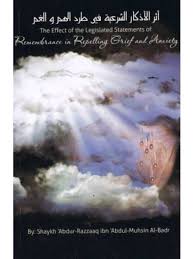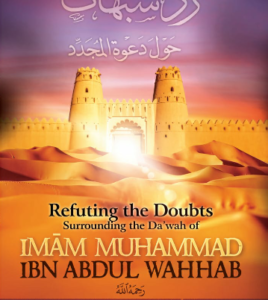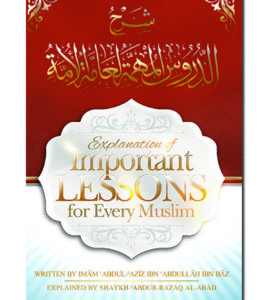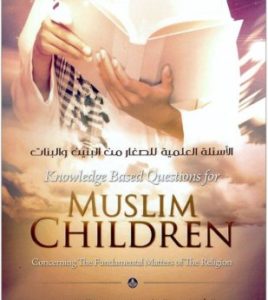Shaikh Abdur-Razzaaq ibn Abdul-Muhsin al-Abbaad
-
B48 Ten Prinicples on al-Istiqaamah
General $5.99A common questions for the scholars, students of knowledge, callers to Allaah and the righteous are often concerning al-Istiqaamah, its reality, the things that help to be firm upon Allaah’s straight path, etc. I thought that it would be beneficial for myself and my brothers in Islam to gather some of the important and comprehensive principles on this subject; so that they may be a light for us. I gathered these principles after studying the sayings of the people of knowledge (may Allaah have mercy upon them) about al-Istiqaamah and that which is connected with it. I shall mention in this treatise 10 great principles concerning the topic of al-Istiqaamah. These principles are important for every one of us to pay attention to.
-
B52 The Effect of the Legislated Statements of Remembrance in Repelling Grief & Anxiety
Fiqh-Worship $6.99The scholars say, If the pain which afflicts the heart is connected with something from the past the it is sadness. If it is connected with something from the future, then it is anxiety. If it I connected to the current condition of the person then it is grief.
Upon investigation into the path to remedy, for grief, and striving to repel and emove this from ones heart, we find that the people are greatly negligent and turn tto variosus directions which are astray from a real remedy. There is nothing which can heal, give ease, give harmony, there is no medicine or cure except in truly returning to Allah the Majestic and High.
-
B93 Reflections of the Believers Resemblance to the Date Tree
General $9.99A parable is a statement that compares one thing to another due to a resemblance between them in order to clarify one from the other and to form it in the mind, and there is no doubt that using parables and examples improve understanding. It does so by bringing to the mind something tangible. Allah says (and His speech consists of the greatest, most definitive proofs):
“And these similitudes We put forward for mankind, but none will understand them except those who have knowledge (of Allâh and His Signs, etc.).”
-
B97 The Fiqh of Du’a
Fiqh-Worship $7.99So, the book of Allah, the mighty and majestic, begins with the du’a and ends with it. The du’a, which is within Al-Fatihah, is the greatest of supplications hands down. (It contains) asking Allah, the blessed and high, for guidance to the straight path and that the servant avoids the paths of those who are astray and those upon whom is the anger of Allah. The last of the book of Allah, the mighty and majestic, contains the du’a of seeking refuge with him, glorified and exalted be he, from the evil of the one who whispers and withdraws; the one who whispers into the hearts of mankind; from the jinn as well as men, in order to make them deviate from the straight path of Allah and upright way.
-
B98 Explanations of the Supplications for the Sick & Afflicted
General $8.00Ibn Al-Qayyim (rahimahullah) said: “This remedy had an effect upon this disease and it removed it to the point that it was as if it never existed. It is the easiest and most convenient form of treatment. If the slave were to properly treat the ailment with Al-Faatihah, he would see an amazing effect in terms of [recovery] and healing.
I had stayed in Makkah for a period of time and some illness had afflicted me. I was not able to find a doctor or any medicine. So I would treat myself with Al-Faatihah and I saw that it has an amazing effect. I would mention that to those who had complained of pain and many of them were healed quickly (by way of it).”
(Al-Jawaab Al-Kaafee p. 5) -
Explanation of the Hadith: When Allah wants good for a person He bestows on him Fiqh of the Religion
Hadith, Learning-Studying $9.99The word, “good” is mentioned in an indefinite form (in Arabic) to attach a level of importance and clarify the abundance of good to whomever Allāh bestows Fiqh of the religion which by it is a means for one’s victory and success. The servant finding happiness in having Fiqh of the religion, devoting oneself to it, regularly attending the sittings of knowledge, being delighted with reading the books from the people of knowledge, also studying and memorizing is among the signs of good for the servant.
The servant should set aside a portion of his day for seeking knowledge. An avenue in which he acquires knowledge is that he doesn’t let a day pass by without obtaining it. Doing this should be among the objectives that the Muslim strives for daily and is serious about acquiring beneficial knowledge. Rather this is the most significant objective the Muslim seeks and strives for its obtainment.
 (267) 428-1723
(267) 428-1723



















